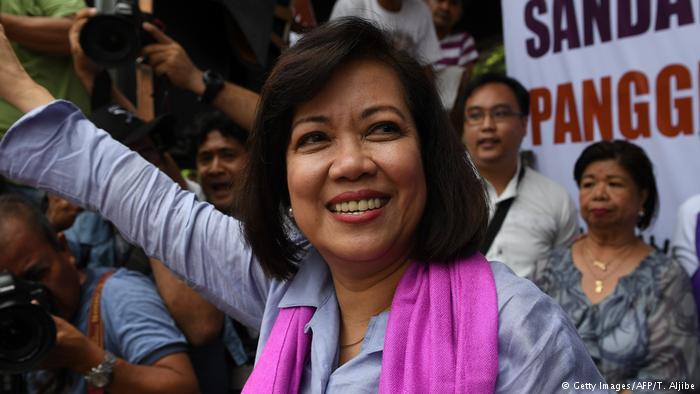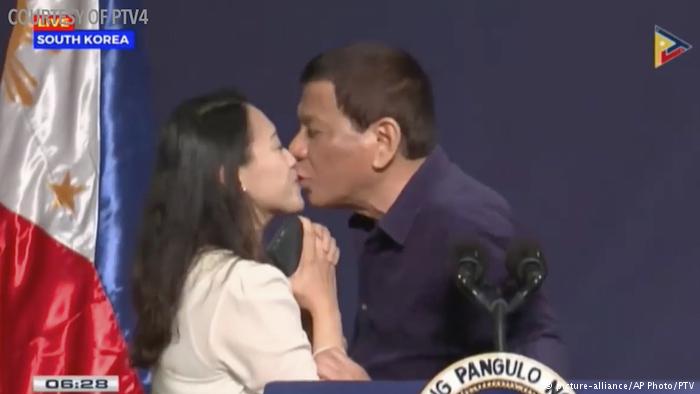When your Tinder feed sounds better than your government

Philippine President Rodrigo Duterte poses for a selfie while surrounded by supporters and lawmakers after delivering his state of the nation address at Congress in Manila on July 23, 2018.
You know there’s trouble when your Tinder feed seems more wholesome than the rhetoric coming from the Presidential Palace.
At first, Tinder may have felt like the 21st century equivalent of being bopped on the head, slung over a man’s shoulder and dragged to his cave. But with online dating fast becoming the go-to “meet market”, Tinder now seems more of a virtual bar with a mix of creeps, average Joes, geeks and the occasional unicorn: the nice guy.
But compared to the Philippine government, with 73-year-old President Rodrigo Duterte at its head, Tinder seems almost benign. Since more than 16 million swiped right and voted Duterte into office in 2016, relentless verbal tirades of sexism and lewd sexual innuendo have been churned out with the speed and regularity of a factory assembly line.
Duterte is that annoying guy whose self-esteem is directly proportional to the number of matches he gets. He can’t accept any kind of criticism or rejection.
When Senator Leila de Lima launched a Senate inquiry into his drug war, he mercilessly shamed her and accused her of having a relationship with her bodyguard/driver, insinuating that that he had a sex tape to prove it. Congress members– many of whom are men and in alliance with Duterte — opened their own inquiry into de Lima. She was alleged to have accepted bribes from drug lords using her driver as her bagman. The sexual innuendo was so heavy that inquiry sounded like a gaggle of hormonal (old) men salivating while watching porn.
Vice-President Leni Robredo also vocalized her opposition to the drug war. In response, Duterte complimented her on her legs and said that when she wore a skirt to Cabinet meetings, he and the other boys fought over who got to sit next to her.
When Lourdes Sereno, the first women to head the Supreme Court, vetoed some of Duterte’s decisions, such as his declaration of Martial Law in the Philippines, he reacted by accusing her of corruption and vowed to have her impeached.

Vice-President Leni Robredo
Men who have opposed Duterte are by no means immune to his wrath, but Duterte has a predilection for shaming women and reducing them to body parts and sexual history.
It is unfortunate that Duterte isn’t just that annoying guy in Tinder but actually a president of state who has made it clear that he rules by two basic principles: punishment and retaliation. Women who dare to stand up to him are confronted with his particularly malevolent form of verbal assault.
Duterte’s pronouncements carry a clairvoyant ring. They are marching orders that his cabinet officials and other legislators execute with much glee, knowing that kowtowing to the president’s vindictive whims will win them a seat at the table — a seat in a senatorial race, a high-ranking appointment, support for a future political bid or the grand slam – all of the above. His words oil the political machinery needed to cut through the bureaucracy and bamboozle institutional checks and balances.
De Lima has now been in detention for almost two years on trumped up drug charges. Sereno was ousted as Chief Justice. Robredo’s Vice Presidency hangs by a thread and is contested by the son and namesake of former dictator Ferdinand Marcos, whom Duterte once introduced as his vice president during a state visit to China.
Taking back the narrative
Filipino women are used to fighting chauvinistic tyranny from the time they are young girls. Just as women have taken back the internet with the snarky, snappy #ByeFelipe page, Filipino women are fighting back.
The Facebook page Bantay Bastos (which roughly translates to Vulgarity Watch) calls on netizens to publicly call out and report misogyny and sexism from government officials.
A network of women’s groups that had long campaigned against the sexism so prevalent in patriarchal Philippine society came together to form an online campaign called #BabaeAko. “It was a first for us to come together. What #BabaeAko did was allow space for independent groups and individuals to join and to encourage different, individual modes of expression and a loose, consensual sisterhood,” says journalist Inday Espina-Varona, one of the founders of the #BabaeAko Movement.
In June, the group took the online campaign to the streets and used artwork to illustrate the continued debasement of women under the Duterte Administration. The following month, during Duterte’s State of the Nation Address, #BabaeAko joined thousands of protestors to cry out against his sexist bias and glaring incompetence.
#BabaeAko will continue to be part of “anti-tyranny mobilizations” says Espina-Varona. Already, the group has been engaging college and high school students in the Philippine capital of Manila and other provinces. They have also given talks at provincial women’s councils and sitting down with women in the provinces who want to establish counterpart networks.

Ousted Philippine Supreme Court Chief Justice Maria Lourdes Sereno waves to supporters in front of the supreme court building in Manila on May 11, 2018.
It seems as if Duterte’s armor — once like Teflon and impervious to public scrutiny — could has taken a hit.
His public satisfaction rates dropped 12 points to 56 percent during this year’s first quarter. This still translates to a “very good” rating but not as good as the initial jaw-dropping approval levels of 90 percent.
A more recent public poll also revealed that 64 percent of the public saw Duterte as vulgar and crass based on three incidents: his foul-mouthed criticism of the UN Human Rights Council, his allegations that some priests had romantic dalliances, and his kissing a Filipino female migrant worker during a visit to South Korea.
Unprecedented inflation rates, a depreciating Philippine peso, acquiescence to China over territorial rights in the South China Sea as well as rice and fish shortages (it is scandalous for an agricultural island nation to run out of rice and fish) are fanning the flames of collective dissent over Duterte’s grievously inept presidency.
Also a woman
Ironically, the most controversial of Duterte’s officials is a woman, the Undersecretary for Communications working in the Presidential Communications Operations Office.
Mocha Uson is like a younger, better looking version of Duterte. She started her career as a singer-dancer who was overtly and unapologetically sexual. And just like Duterte, Uson does not seem to comprehend the gravitas of her public mandate. On her Facebook page, which has with more than five million followers, she has spread fake news, vilified news networks critical of Duterte and rallied supporters to bully or troll other political opponents.
Uson recently released a video to promote the move to a federal form of government, one of Duterte’s pet policies. The video was crudely shot and loaded with obscenity, repeatedly making reference to male and female genitals to explain certain concepts. The video unleashed a colossal wave of online criticism. Duterte simply gave Uson a slight rap on the wrist but many government officials called on her to resign. To this day, the president’s pet remains in office.
But there is a definite change that Duterte is feeling too. He knows that fear and unquestioning approval are the only way he can get support for his policies, whether his controversial “War on Drugs” or his push for federalism.
He has recently started saying that he might resign because he is tired. Once, these declarations sounded like threats. Now, they just sound like the whining of a someone who is clearly in over his head.
“He is unmotivated and sounds like someone who is genuinely not interested in his job anymore,” said political analyst Richard Heydarian.
But Duterte does not seem to have a clear exit strategy. Heydarian predicts more “political decay and fragmentation.”
And of course, so long as Duterte is president, the sexism and misogyny will continue.

In this video from PTV taken Sunday, June 3, 2018, Philippines President Rodrigo Duterte leans in to kiss a Filipino worker at the podium during a town hall-style meeting with overseas Filipino workers in Seoul, South Korea.
“There is no overnight answer to misogyny. But we have managed to put the regime on the defensive,” says Espina-Varona. “The big step is getting women to step up and step out, be more vocal, louder in pushing back. I don’t think the government expected the pushback on the obscene federalism ditty. We are a sign of the times.”
“We will just keep calling him out. We should not accept his behavior even if he is president,” agrees Risa Hontiveros, an opposition senator who has also been on the receiving end of Duterte and his troll army’s character assassination.
Keep calling them out until the next election (senatorial elections are slated for 2019) when we can vote to swipe left and not elect Duterte and his cronies into office. That’s the next step and the closest we get to unmatching and blocking them so they don’t pollute our feed ever again.
Author: Ana P. Santos (act)






